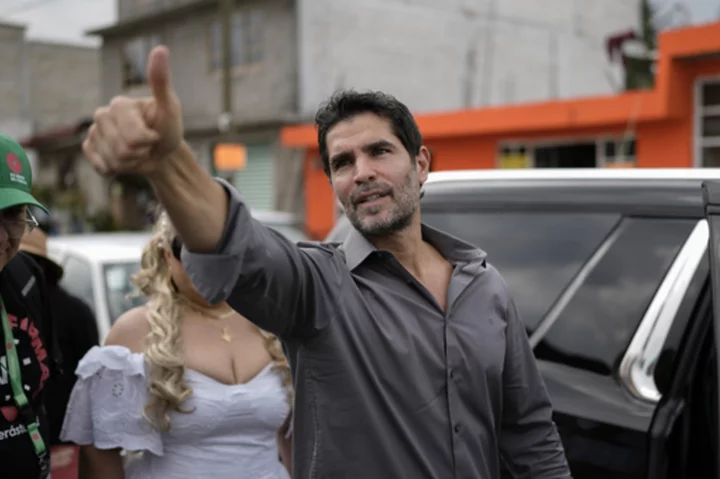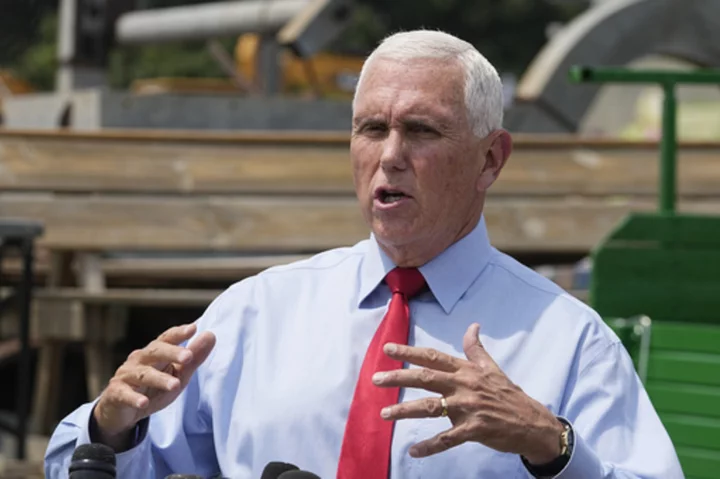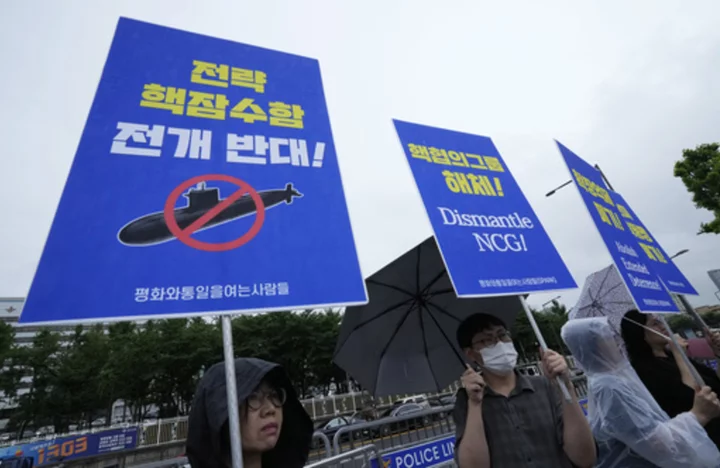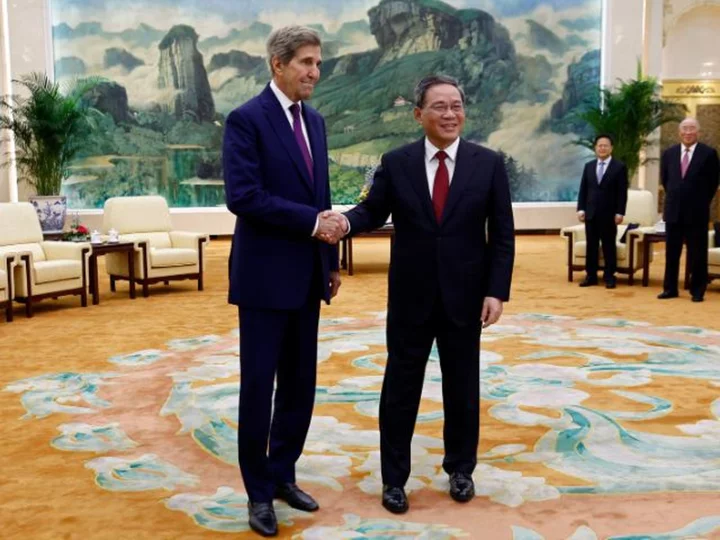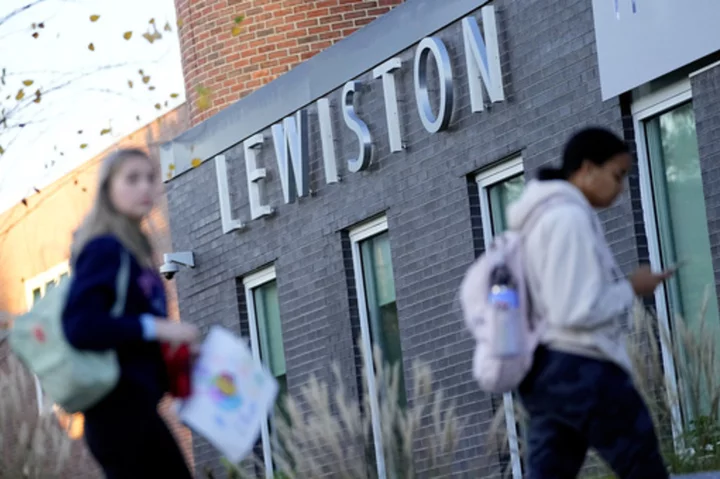MEXICO CITY (AP) — The morning after Mexico’s Supreme Court decriminalized abortion, right-wing activist and film producer Eduardo Verástegui dressed up in a black suit to register as an independent candidate for the 2024 presidential campaign.
“Mourning is a reminder for me to recall why I’m doing this,” the former telenovela actor recently told supporters.
Rallying all over the country to fulfill the difficult task of gathering 1 million signatures by early January, the 49-year-old has ignited controversy in this deeply Catholic nation, where abortion activists and the LGBTQ+ community lead advocacy campaigns of their own.
While many Mexican politicians refrain from clarifying where they stand on religion, LGBTQ+ rights and abortion, Verástegui prays on TikTok and publicly claims that getting closer to God changed the course of his life. He speaks against LGBTQ+ inclusion, and if elected, he says he would do anything in his power to reverse abortion access.
“I identify with his values, with his Catholic faith,” said Alejandra Hernández, 46, during a training session for volunteers gathering signatures for him.
Nearby, wrapped in a shawl stamped with an image of Our Lady of Guadalupe, Felícitas Díaz, 65, said she supports Verástegui because he is the only prominent anti-abortion candidate.
“Killing innocent beings is not OK,” Díaz said, referring to the widening of abortion access. “I was sad, worried, thinking ‘Who am I going to vote for?’ and when I was told about him, a light opened up for me.”
For decades, Díaz said, she sympathized with a conservative political party that shared her ideology, but the decisions made by its leaders ahead of 2024 elections dismayed her.
Lacking opponents to challenge Claudia Sheinbaum, the former mayor of Mexico City who leads the polls to succeed President Andrés Manuel López Obrador, the National Action Party — which Díaz favored — created a coalition with other parties and chose Senator Xóchitl Gálvez as a contender.
Both Sheinbaum and Gálvez are seen as progressive — and therefore are rejected — by Mexico’s conservative sector.
Raúl Tortolero, a writer who sympathizes with Verástegui, said the former pop singer champions a “new right” by advocating for values resembling Donald Trump in the United States, José Antonio Kast in Chile and Santiago Abascal in Spain.
This “new right,” Tortolero said, is religious at its core and is structured around a few key principles: God at the center of life, the rejection of abortion and LGBTQ+ inclusion, and the defense of private property, among others.
Verástegui’s political project, which he calls “God, Homeland and Family," proposes to incorporate Christian values into the government and appeal to younger voters.
“More than far-right, as the media calls us, we are patriots,” said Isaac Alonso, a 31-year-old entrepreneur who leads a group of young people supporting Verástegui.
“We are brave women and men who cannot leave our future in the hands of corrupt politicians who are incapable of governing themselves.”
Frida Espinoza, who is 23 and co-founded an anti-abortion organization, said that she connected with Verástegui after listening to his life testimony — how he renounced fame and vices to embrace God — and is willing to support him even if he has little chance of getting on the ballot alongside Sheinbaum and Gálvez.
“Parties are allying themselves with values that do not represent me,” Espinoza said. “And I am not going to legitimize a person who opposes everything I believe in.”
Entrepreneurs and TV personalities have played a key role in Latin America’s politics for years — Guatemala elected a TV comedian in 2015 — but a figure like Verástegui, who declined to be interviewed, is unique in Mexico’s recent history.
When López Obrador was elected in 2018, he played a role as an outsider because he and his party —Morena — defied political structures, said Diego Fonseca, a writer and editor who recently published a book about populism in Latin America.
But now, Fonseca said, Morena has become a more conventional space and the transition of power will take López Obrador away from the spotlight. He said Verástegui seeks to be a messianic figure and offers a populist message “based on simple, easily digestible ideas.”
Some of these ideas have sparked anger and concerns among critics, human rights organizations and local media who have fact-checked several of his claims. This year alone, Verástegui said that pedophilia was linked to homosexuality, and he recorded himself firing a rifle to portray what he would do to “the terrorists of the 2030 agenda, climate change and gender ideology.”
“In many democratic countries, we have seen politicians like Verástegui cynically campaign to conservative voters on the promise to bring back ‘Christian’ or ‘traditional’ values,” said Cristian González, researcher at Human Rights Watch.
But some of these politicians, who Verástegui has said he admires, like Hungary’s Prime Minister Viktor Orbán, former Brazilian President Jair Bolsonaro or Trump have rallied against LGBTQ+ rights, marriage equality and abortion while distracting attention from attacks on judicial independence, trust in the electoral system and press freedom, González said.
Attendees at Verástegui's rallies are pleased that he is not a traditional politician and many feel moved by the retelling of his personal story.
He was born in northern Mexico and moved the capital to pursue an acting career, defying his parents who expected him to become a lawyer. A few years later, feeling his success had stalled, he migrated to the United States, where a woman that was supposed to teach him English asked: “What’s the purpose of your life, Eduardo?”
And so, Verástegui has said, he decided to change. No more complaining without proposing solutions. No more empty relationships. No more projects that would contradict his faith, his family or his country.
He became a producer to finance movies in accordance with his views — among them are two anti-abortion films and one about child trafficking — and reassure his followers that he is ready to rule.
“I don’t have experience stealing nor do I want to have it,” he said recently, referring corruption scandals. “My ability is to work on specific projects, to bring together the best team, provide a vision and let everybody work.”
Populism, Fonseca said, is linked to the exercise of faith and relies on charisma. A figure like Verástegui builds a story built around the idea that he, as a leader, is a redeemer committed to rescuing the soul of the nation from the hands of its enemies.
“I like how he was able to give up what his convictions told him to,” said Marisol Hernández, 24, a few minutes after Verástegui kneeled in public, arms pointing to the sky, asking for forgiveness for the damage that all men have caused to the women of the world.
“He himself says, ‘I’m not a saint, I’ve made mistakes,’ but he recognizes that God has acted in his life and that is the most fundamental thing.”
——
Associated Press religion coverage receives support through the AP’s collaboration with The Conversation US, with funding from Lilly Endowment Inc. The AP is solely responsible for this content.

